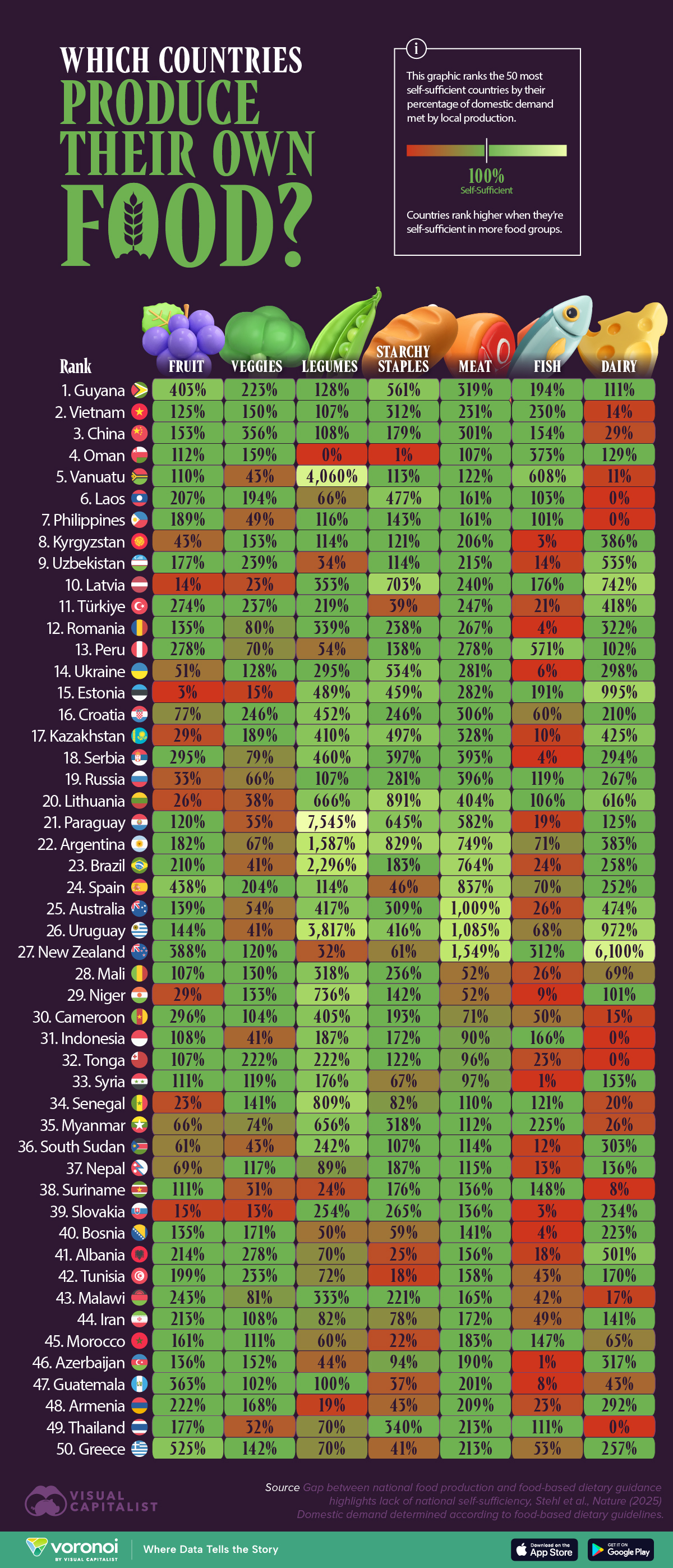Ranked: 50 Countries That Can Feed Themselves
This was originally posted on our Voronoi app. Download the app for free on iOS or Android and discover incredible data-driven charts from a variety of trusted sources.
Key Takeaways
- Out of 186 countries in this study, and in the top 50, only Guyana hits 100% food self-sufficiency in all seven food groups.
- European countries struggle with fruit and vegetable self-sufficiency, while Asian countries struggle with dairy.
How prepared is your country to put three balanced meals on the table using only its own farms, orchards, and fisheries?
The infographic below ranks the 50 nations come closest to full food independence—and which key food groups still need to be imported.
The underlying data comes from a May 2025 study published in Nature Food called Gap between national food production and food-based dietary guidance highlights lack of national self-sufficiency by Stehl, J., Vonderschmidt, A., Vollmer, S. et al.
Researchers compared national production with Livewell dietary guidelines across seven major food categories: fruit, vegetables, legumes, starchy staples, meat, fish, and dairy.
ℹ️ The Livewell diet takes into account sustainability of food source as well, which may impact these rankings.
Self-sufficiency is achieved with a 100% rating in each category. Above it indicates export capacity and below indicates import requirements.
Guyana: The Only Country That Can Completely Feed Itself
Technically, Guyana stands alone with a perfect score across all seven food groups.
| 🇬🇾 Guyana | 7 | 403 | 223 | 128 |
| 🇻🇳 Vietnam | 6 | 125 | 150 | 107 |
| 🇨🇳 China | 6 | 153 | 356 | 108 |
| 🇴🇲 Oman | 5 | 112 | 159 | 0 |
| 🇻🇺 Vanuatu | 5 | 110 | 43 | 4060 |
| 🇱🇦 Laos | 5 | 207 | 194 | 66 |
| 🇵🇭 Philippines | 5 | 189 | 49 | 116 |
| 🇰🇬 Kyrgyzstan | 5 | 43 | 153 | 114 |
| 🇺🇿 Uzbekistan | 5 | 177 | 239 | 34 |
| 🇱🇻 Latvia | 5 | 14 | 23 | 353 |
| 🇹🇷 Türkiye | 5 | 274 | 237 | 219 |
| 🇷🇴 Romania | 5 | 135 | 80 | 339 |
| 🇵🇪 Peru | 5 | 278 | 70 | 54 |
| 🇺🇦 Ukraine | 5 | 51 | 128 | 295 |
| 🇪🇪 Estonia | 5 | 3 | 15 | 489 |
| 🇭🇷 Croatia | 5 | 77 | 246 | 452 |
| 🇰🇿 Kazakhstan | 5 | 29 | 189 | 410 |
| 🇷🇸 Serbia | 5 | 295 | 79 | 460 |
| 🇷🇺 Russia | 5 | 33 | 66 | 107 |
| 🇱🇹 Lithuania | 5 | 26 | 38 | 666 |
| 🇵🇾 Paraguay | 5 | 120 | 35 | 7545 |
| 🇦🇷 Argentina | 5 | 182 | 67 | 1587 |
| 🇧🇷 Brazil | 5 | 210 | 41 | 2296 |
| 🇪🇸 Spain | 5 | 438 | 204 | 114 |
| 🇦🇺 Australia | 5 | 139 | 54 | 417 |
| 🇺🇾 Uruguay | 5 | 144 | 41 | 3817 |
| 🇳🇿 New Zealand | 5 | 388 | 120 | 32 |
| 🇲🇱 Mali | 4 | 107 | 130 | 318 |
| 🇳🇪 Niger | 4 | 29 | 133 | 736 |
| 🇨🇲 Cameroon | 4 | 296 | 104 | 405 |
| 🇮🇩 Indonesia | 4 | 108 | 41 | 187 |
| 🇹🇴 Tonga | 4 | 107 | 222 | 222 |
| 🇸🇾 Syria | 4 | 111 | 119 | 176 |
| 🇸🇳 Senegal | 4 | 23 | 141 | 809 |
| 🇲🇲 Myanmar | 4 | 66 | 74 | 656 |
| 🇸🇸 South Sudan | 4 | 61 | 43 | 242 |
| 🇳🇵 Nepal | 4 | 69 | 117 | 89 |
| 🇸🇷 Suriname | 4 | 111 | 31 | 24 |
| 🇸🇰 Slovak Republic | 4 | 15 | 13 | 254 |
| 🇧🇦 Bosnia & Herzegovina | 4 | 135 | 171 | 50 |
| 🇦🇱 Albania | 4 | 214 | 278 | 70 |
| 🇹🇳 Tunisia | 4 | 199 | 233 | 72 |
| 🇲🇼 Malawi | 4 | 243 | 81 | 333 |
| 🇮🇷 Iran | 4 | 213 | 108 | 82 |
| 🇲🇦 Morocco | 4 | 161 | 111 | 60 |
| 🇦🇿 Azerbaijan | 4 | 136 | 152 | 44 |
| 🇬🇹 Guatemala | 4 | 363 | 102 | 100 |
| 🇦🇲 Armenia | 4 | 222 | 168 | 19 |
| 🇹🇭 Thailand | 4 | 177 | 32 | 70 |
| 🇬🇷 Greece | 4 | 525 | 142 | 70 |
Guyana’s fertile alluvial plains yield bumper harvests of rice and starchy roots. Riverine fisheries and pastureland boost meat and fish production to more than what its 900,000 residents require.
Few other countries crack the “all-star” club: Vietnam and China, meet six food groups and another 23 countries cover five.
The general takeaway is clear: total food self-sufficiency remains the exception, not the rule.
Europe’s Fruit & Veggie Gap
Fruit may seem abundant in European supermarkets, but the numbers tell a different story.
Among the top-ranked countries, Russia meets only 33% of its domestic fruit needs, Latvia, 13% and Estonia a mere 3%. Vegetable production is not much better for the same three countries.
However, Southern Europe does fare well in this regard.
Spain for example produces 4x the amount of fruits and vegetables its residents need, exporting the rest of it to north.
Asia’s Persistent Dairy Deficit
For much of Asia, milk and cheese are luxury imports.
Vietnam and China score well on five other food groups, but dairy self-sufficiency sits at only 14% and 29%, respectively.
| 🇬🇾 Guyana | 561 | 319 | 194 | 111 |
| 🇻🇳 Vietnam | 312 | 231 | 230 | 14 |
| 🇨🇳 China | 179 | 301 | 154 | 29 |
| 🇴🇲 Oman | 1 | 107 | 373 | 129 |
| 🇻🇺 Vanuatu | 113 | 122 | 608 | 11 |
| 🇱🇦 Laos | 477 | 161 | 103 | 0 |
| 🇵🇭 Philippines | 143 | 161 | 101 | 0 |
| 🇰🇬 Kyrgyzstan | 121 | 206 | 3 | 386 |
| 🇺🇿 Uzbekistan | 114 | 215 | 14 | 535 |
| 🇱🇻 Latvia | 703 | 240 | 176 | 742 |
| 🇹🇷 Türkiye | 39 | 247 | 21 | 418 |
| 🇷🇴 Romania | 238 | 267 | 4 | 322 |
| 🇵🇪 Peru | 138 | 278 | 571 | 102 |
| 🇺🇦 Ukraine | 534 | 281 | 6 | 298 |
| 🇪🇪 Estonia | 459 | 282 | 191 | 995 |
| 🇭🇷 Croatia | 246 | 306 | 60 | 210 |
| 🇰🇿 Kazakhstan | 497 | 328 | 10 | 425 |
| 🇷🇸 Serbia | 397 | 393 | 4 | 294 |
| 🇷🇺 Russia | 281 | 396 | 119 | 267 |
| 🇱🇹 Lithuania | 891 | 404 | 106 | 616 |
| 🇵🇾 Paraguay | 645 | 582 | 19 | 125 |
| 🇦🇷 Argentina | 829 | 749 | 71 | 383 |
| 🇧🇷 Brazil | 183 | 764 | 24 | 258 |
| 🇪🇸 Spain | 46 | 837 | 70 | 252 |
| 🇦🇺 Australia | 309 | 1009 | 26 | 474 |
| 🇺🇾 Uruguay | 416 | 1085 | 68 | 972 |
| 🇳🇿 New Zealand | 61 | 1549 | 312 | 6100 |
| 🇲🇱 Mali | 236 | 52 | 26 | 69 |
| 🇳🇪 Niger | 142 | 52 | 9 | 101 |
| 🇨🇲 Cameroon | 193 | 71 | 50 | 15 |
| 🇮🇩 Indonesia | 172 | 90 | 166 | 0 |
| 🇹🇴 Tonga | 122 | 96 | 23 | 0 |
| 🇸🇾 Syria | 67 | 97 | 1 | 153 |
| 🇸🇳 Senegal | 82 | 110 | 121 | 20 |
| 🇲🇲 Myanmar | 318 | 112 | 225 | 26 |
| 🇸🇸 South Sudan | 107 | 114 | 12 | 303 |
| 🇳🇵 Nepal | 187 | 115 | 13 | 136 |
| 🇸🇷 Suriname | 176 | 136 | 148 | 8 |
| 🇸🇰 Slovak Republic | 265 | 136 | 3 | 234 |
| 🇧🇦 Bosnia & Herzegovina | 59 | 141 | 4 | 223 |
| 🇦🇱 Albania | 25 | 156 | 18 | 501 |
| 🇹🇳 Tunisia | 18 | 158 | 43 | 170 |
| 🇲🇼 Malawi | 221 | 165 | 42 | 17 |
| 🇮🇷 Iran | 78 | 172 | 49 | 141 |
| 🇲🇦 Morocco | 22 | 183 | 147 | 65 |
| 🇦🇿 Azerbaijan | 94 | 190 | 1 | 317 |
| 🇬🇹 Guatemala | 37 | 201 | 8 | 43 |
| 🇦🇲 Armenia | 43 | 209 | 23 | 292 |
| 🇹🇭 Thailand | 340 | 213 | 111 | 0 |
| 🇬🇷 Greece | 41 | 213 | 53 | 257 |
The region’s tropical climate, smaller pastureland, and cultural dietary patterns all limit large-scale dairy herds.
Kyrgyzstan and Uzbekistan are rare exceptions, surpassing domestic dairy needs by leveraging high-altitude grazing.
Can the U.S. Feed Itself?
The U.S. is solidly middle of the pack, achieving food self-sufficiency in four out of seven food groups. This is around the same as Canada, and double that of the UK (two groups).
Here’s its scores broken down by food group:
- Fruit: 70%
- Vegetables: 61%
- Legumes: 1,259%
- Starchy Staples: 188%
- Meat: 717%
- Fish: 43%
- Dairy: 409%
From related coverage of U.S. farmland, it’s easily explained why the country outperforms in legumes, starchy staples, meat, and dairy.
Furthermore, as this National Geographic article explains, countries may easily have the capability to produce to meet their own requirements, but food imports may be cheaper in the long run.
Learn More on the Voronoi App 
If you enjoyed today’s post, check out The Countries That Rely on Agriculture Exports on Voronoi, the new app from Visual Capitalist.
.png)




